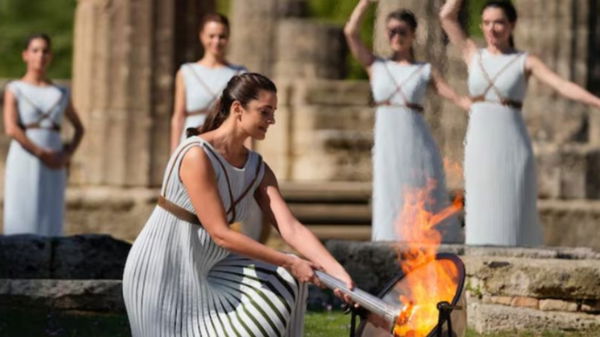Amidst Paris Olympics Flame Ceremony, Recalling The First Woman to Light Up the Torch After 72 Years of Ban

Follow Us

The flame for the Paris Olympics Games was kindled in a momentous ceremony at ancient Olympia on Tuesday,16 April. It marked the end of seven years of hard work to get everything ready for the games, which are commencing on July 26th. However, this year’s ignition took an unexpected turn from tradition as Greek actress Mary Mina, who played the role of the high priestess, utilized a backup flame instead of the customary parabolic mirror. This deviation was prompted by the overcast skies looming above the event.
Now, the torch is on its way through Greece and France, making its way to Paris for the big opening ceremony. Paris has hosted the Summer Olympics twice before, in 1900 and 1924, so it’s no stranger to the excitement that ensues. But here’s something interesting: did you know that there was a time when women weren’t allowed to light the Olympic flame in 1896? It’s true! But things changed, and now we’re left wondering: who was the first woman to break that barrier and light the flame?
A harken back to the firebrand maiden woman embarking on a lit Paris Olympics
ADVERTISEMENT
Article continues below this ad
In ancient Greece, women were strictly prohibited from participating in or even attending the Olympic Games. Any woman who dared to intrude faced severe consequences, often met with punitive punishment. However, Enriqueta Basilio made history in 1968 as the first woman to complete the Olympic torch relay, igniting the cauldron to commence the Mexico City Games. As TIME reported, the event was a spectacle of grandeur, with 40,000 balloons ascending into the sky and 6,000 pigeons taking flight.
ADVERTISEMENT
Article continues below this ad

Trending

Bronny in Deep Waters as $800,000 Suffering Forces LeBron James’ Son to End College Career With Major Declining Numbers
April 27, 2024 01:45 PM EDT

Bronny’s Suffering Doesn’t Affect Brother Bryce as LeBron James’ Younger Son Sees Stability Financially
April 28, 2024 02:24 PM EDT

“Trying to Mourn…”: After “Brother’s” Death, Brenden Rice Admits Falling 4 Rounds in the NFL Draft as Chargers Draft Jerry Rice’s Son
April 28, 2024 11:50 AM EDT

“Simone (Biles’) Retirement”: Gymnastics World Worried After Coach Cecile Landi’s Georgia Decision
April 26, 2024 02:42 AM EDT

“Colby Called the Cops” – Ryan Garcia Teaching Covington His Boxing Secrets Leaves Combat World in Splits
April 28, 2024 07:49 AM EDT
Get instantly notified of the hottest Olympics stories via Google! Click on Follow Us and Tap the Blue Star.

Follow Us
The torch, symbolizing the spirit of the Games, completed its 10,000-mile journey from Olympia, carried for the first time by a woman, the 20-year-old Norma Enriqueta Basilio Sotelo of Mexico. With a final 21-gun salute echoing through the air, the XIX Olympiad officially began. However, what’s next for this year’s flame of the Paris Olympics, freshly ignited today following its journey through Greece and France? Where will this torch journey to next?
The rite of passage of the Paris Olympic Flame from Athens to Marseille
ADVERTISEMENT
Article continues below this ad
The symbolic flame of the Olympics will undergo a ceremonial transfer to the Paris Games organizers on April 26th at Athens’s historic Panathenaic Stadium, the very site where the inaugural modern Games took place in 1896. This pivotal moment follows an 11-day relay journey across Greece, steeped in historical significance and Olympic tradition. Departing the next day aboard the majestic three-masted ship, the “Belem,” the flame will set sail for France, destined to arrive on May 8th in Marseille.
Anticipation runs high for the grand ceremony expected to draw up to 150,000 attendees to Marseille’s Old Port, marking the flame’s symbolic arrival on French soil. Marseille, with its ancient roots dating back to Greek settlers in 600 B.C., holds a special significance as the chosen venue for the sailing competitions of the upcoming Games. The French leg of the torch relay, spanning 68 days, will culminate in the heart of Paris on July 26th, where the Olympic flame will be ceremoniously lit, igniting the spirit of the Games.
Edited by:

Himanshu Sridhar
